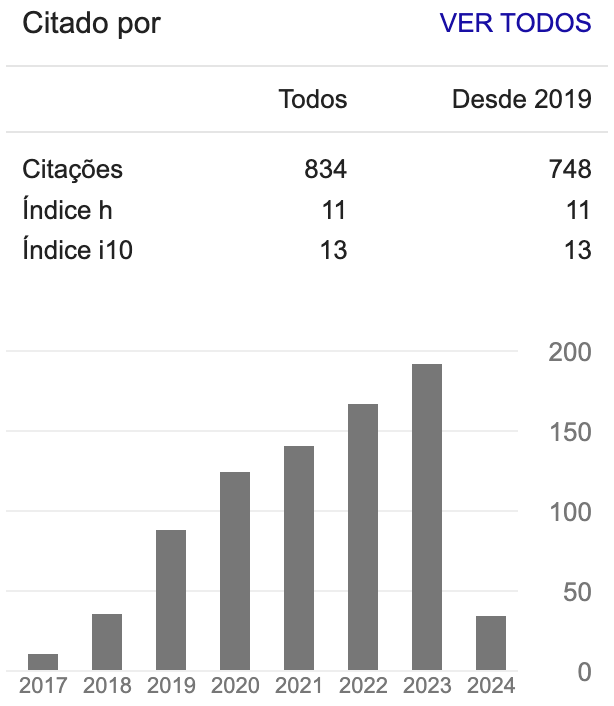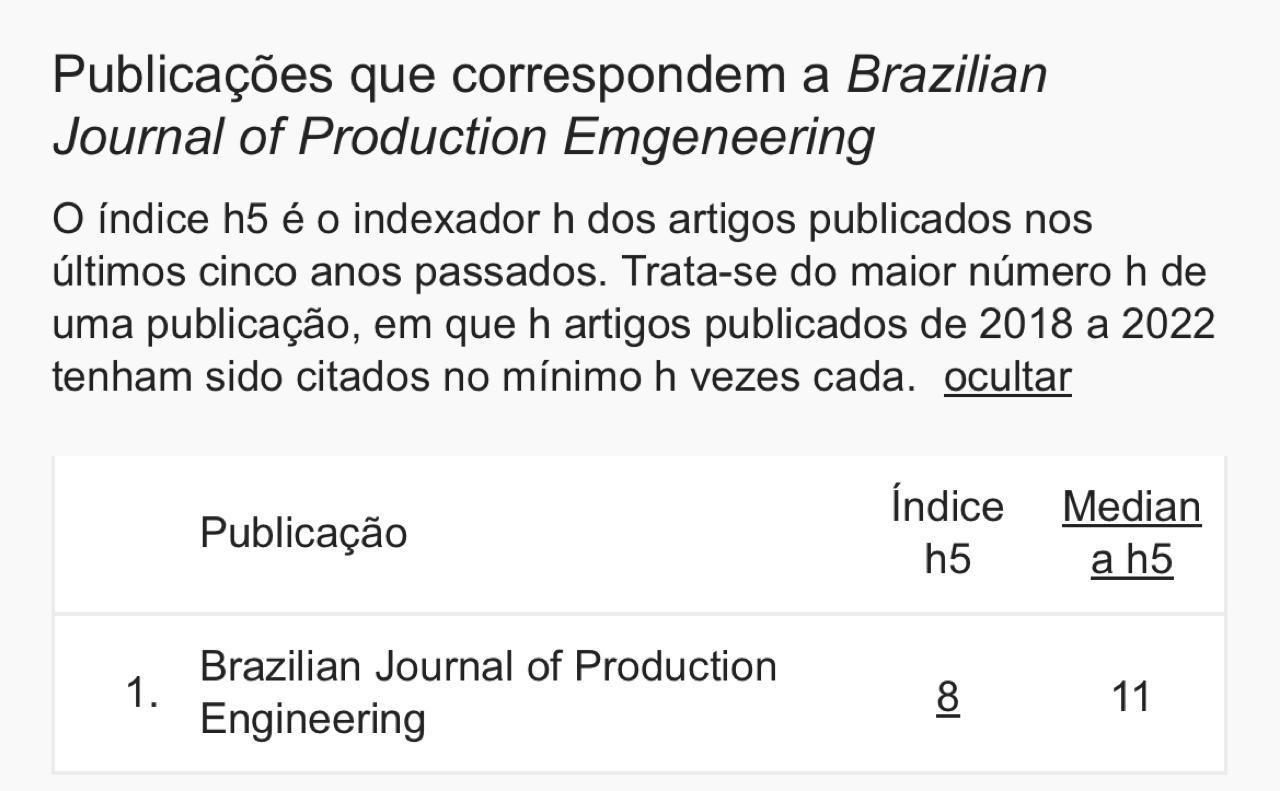Industry 4.0 applied to supply chain management: a literature review
DOI:
https://doi.org/10.47456/bjpe.v7i2.35009Keywords:
Logistics 4.0, Industry 4.0, Bibliometric reviewAbstract
The development of industry 4.0 is popularizing the new technologies to improve logistics and supply chain management activities to increase process efficiency. Therefore, the present work aims to identify the current research conditions on the subject through a bibliometric and systematic review of papers published on the base Web of Science, giving a special focus to Brazilian studies, that is still in growth. The results show the growing relevance of the theme and the interest on the part of major journals. In relation to the national publications, there is interest in the internet of things and in the cyber-physical systems. The Brazilian analyzed papers focus on economic and operational issues, but there is also a concern about environmental issues.
Downloads
References
Ardito, L., Petruzzelli, A. M., Panniello, U., & Garavelli, A. C. (2019). Towards Industry 4.0: Mapping digital technologies for supply chain management-marketing integration. Business Process Management Journal, 25(2), 323-346. https://doi.org/10.1108/BPMJ-04-2017-0088
Arnold, C., Kiel, D., & Voigt, K. I. (2017). Innovative business models for the industrial internet of things. BHM Berg-und Hüttenmännische Monatshefte, 162(9), 371-381. https://doi.org/10.1007/s00501-017-0667-7
Barreto, L., Amaral, A., & Pereira, T. (2017). Industry 4.0 implications in logistics: an overview. Procedia Manufacturing, 13, 1245-1252. https://doi.org/10.1016/j.promfg.2017.09.045
Bastos, M. H. R., de Oliveira, U. R., de Rezende Souza, T. C., dos Santos, R. F., & do Lago, M. M. (2019). Análise de discurso e Análise de Conteúdo: Um levantamento de suas aplicações nas ciências aplicadas membros da Administração. Brazilian Journal of Development, 5(11), 26302-26322. https://doi.org/10.34117/bjdv5n11-265
Bauer, W., Hämmerle, M., Schlund, S., & Vocke, C. (2015). Transforming to a hyper-connected society and economy–towards an “Industry 4.0”. Procedia Manufacturing, 3, 417-424. https://doi.org/10.1016/j.promfg.2015.07.200
BRASIL, Ministério da Indústria, Comércio Exterior e Serviços. Agenda Brasileira para a Indústria 4.0. Recuperado de http://www.industria40.gov.br/
Chen, W., Liu, W., Geng, Y., Brown, M. T., Gao, C., & Wu, R. (2017). Recent progress on emergy research: A bibliometric analysis. Renewable and Sustainable Energy Reviews, 73, 1051-1060. https://doi.org/10.1016/j.rser.2017.02.041
Daú, G., Scavarda, A., Scavarda, L. F., & Portugal, V. J. T. (2019). The healthcare sustainable supply chain 4.0: The circular economy transition conceptual framework with the corporate social responsibility mirror. Sustainability, 11(12), 3259. https://doi.org/10.3390/su11123259
de Abreu, V. H. S., & de Souza, G. M. (2019). Uma revisão bibliométrica sobre a impressão 3D em concreto. Brazilian Journal of Production Engineering - BJPE, 5(5), 50–62.
Dolgui, A., Ivanov, D., Sethi, S. P., & Sokolov, B. (2019). Scheduling in production, supply chain and Industry 4.0 systems by optimal control: fundamentals, state-of-the-art and applications. International Journal of Production Research, 57(2), 411-432. https://doi.org/10.1080/00207543.2018.1442948
Dolgui, A., Ivanov, D., Potryasaev, S., Sokolov, B., Ivanova, M., & Werner, F. (2020). Blockchain-oriented dynamic modelling of smart contract design and execution in the supply chain. International Journal of Production Research, 58(7), 2184-2199. https://doi.org/10.1080/00207543.2019.1627439
Engblom, J., Solakivi, T., Töyli, J., & Ojala, L. (2012). Multiple-method analysis of logistics costs. International Journal of Production Economics, 137(1), 29-35. https://doi.org/10.1016/j.ijpe.2012.01.007
Erol, S., Jäger, A., Hold, P., Ott, K., & Sihn, W. (2016). Tangible Industry 4.0: a scenario-based approach to learning for the future of production. Procedia CiRp, 54, 13-18. https://doi.org/10.1016/j.procir.2016.03.162
Fernandez, J. T., Jiménez, J. B. (2017). Supply chain integration and performance relationship: a moderating effects review. The International Journal of Logistics Management, 28(4), 1243-1271. https://doi.org/10.1108/IJLM-02-2016-0043
Frazzon, E. M., Albrecht, A., Pires, M., Israel, E., Kück, M., & Freitag, M. (2018). Hybrid approach for the integrated scheduling of production and transport processes along supply chains. International Journal of Production Research, 56(5), 2019-2035. https://doi.org/10.1080/00207543.2017.1355118
Frazzon, E. M., Rodriguez, C. M. T., Pereira, M. M., Pires, M. C., & Uhlmann, I. (2019). Towards supply chain management 4.0. Brazilian Journal of Operations & Production Management, 16(2), 180-191. https://doi.org/10.14488/BJOPM.2019.v16.n2.a2
Frederico, G. F., Garza-Reyes, J. A., Anosike, A., & Kumar, V. (2019). Supply Chain 4.0: concepts, maturity and research agenda. Supply Chain Management: An International Journal, 25(2), 262–282. https://doi.org/10.1108/scm-09-2018-0339
Frederico, G. F., Garza-Reyes, J. A., Kumar, A., & Kumar, V. (2020). Performance measurement for supply chains in the Industry 4.0 era: a balanced scorecard approach. International Journal of Productivity and Performance Management, 70(4), 789-807. https://doi.org/10.1108/IJPPM-08-2019-0400
Galindo, L. D. (2016). The challenges of logistics 4.0 for the supply chain management and the information technology. Dissertação de mestrado, NTNU.
Hofmann, E., & Rüsch, M. (2017). Industry 4.0 and the current status as well as future prospects on logistics. Computers in industry, 89, 23-34. https://doi.org/10.1016/j.compind.2017.04.002
Ivanov, D., Dolgui, A., Sokolov, B., Werner, F., & Ivanova, M. (2016). A dynamic model and an algorithm for short-term supply chain scheduling in the smart factory industry 4.0. International Journal of Production Research, 54(2), 386-402. https://doi.org/10.1080/00207543.2014.999958
Ivanov, D., Dolgui, A., & Sokolov, B. (2019). The impact of digital technology and Industry 4.0 on the ripple effect and supply chain risk analytics. International Journal of Production Research, 57(3), 829-846. https://doi.org/10.1080/00207543.2018.1488086
Kagermann, H., Helbig, J., Hellinger, A., & Wahlster, W. (2013). Recommendations for implementing the strategic initiative INDUSTRIE 4.0: Securing the future of German manufacturing industry; final report of the Industrie 4.0 Working Group. Forschungsunion.
Kang, H. S., Lee, J. Y., Choi, S., Kim, H., Park, J. H., Son, J. Y., Kim, B. H., & Do Noh, S. (2016). Smart manufacturing: Past research, present findings, and future directions. International journal of precision engineering and manufacturing-green technology, 3(1), 111-128. https://doi.org/10.1007/s40684-016-0015-5
Kovács, G., & Kot, S. (2016). New logistics and production trends as the effect of global economy changes. Polish Journal of Management Studies, 14. https://doi.org/10.17512/pjms.2016.14.2.11
Lasi, H., Fettke, P., Kemper, H. G., Feld, T., & Hoffmann, M. (2014). Industry 4.0. Business & information systems engineering, 6(4), 239-242. Recuperado de https://aisel.aisnet.org/bise/vol6/iss4/5
Lee, C. K. M., Lv, Y., Ng, K. K. H., Ho, W., & Choy, K. L. (2018). Design and application of Internet of things-based warehouse management system for smart logistics. International Journal of Production Research, 56(8), 2753-2768. https://doi.org/10.1080/00207543.2017.1394592
Luthra, S., & Mangla, S. K. (2018). Evaluating challenges to Industry 4.0 initiatives for supply chain sustainability in emerging economies. Process Safety and Environmental Protection, 117, 168-179. https://doi.org/10.1016/j.psep.2018.04.018
Matana, G., Simon, A., Godinho Filho, M., & Helleno, A. (2020). Method to assess the adherence of internal logistics equipment to the concept of CPS for industry 4.0. International Journal of Production Economics, 228, 107845. https://doi.org/10.1016/j.ijpe.2020.107845
Melnyk, S. A., Lummus, R. R., Vokurka, R. J., Burns, L. J., & Sandor, J. (2009). Mapping the future of supply chain management: a Delphi study. International journal of production Research, 47(16), 4629-4653. https://doi.org/10.1080/00207540802014700
Pedroso, M. C., & Nakano, D. (2009). Knowledge and information flows in supply chains: A study on pharmaceutical companies. International journal of production economics, 122(1), 376-384. https://doi.org/10.1016/j.ijpe.2009.06.012
Pereira, A., de Oliveira Simonetto, E., Putnik, G., & de Castro, H. C. G. A. (2018). How connectivity and search for producers impact production in Industry 4.0 networks. Brazilian Journal of Operations & Production Management, 15(4), 528-534. https://doi.org/10.14488/BJOPM.2018.v15.n4.a6
Prajogo, D., & Sohal, A. (2013). Supply chain professionals: A study of competencies, use of technologies, and future challenges. International Journal of Operations & Production Management, 33(11-12), 1532-1554. https://doi.org/10.1108/IJOPM-08-2010-0228
Premm, M., & Kirn, S. (2015). A multiagent systems perspective on Industry 4.0 supply networks. In German Conference on Multiagent System Technologies, Springer, Cham.
Queiroz, M. M., Pereira, S. C. F., Telles, R., & Machado, M. C. (2019). Industry 4.0 and digital supply chain capabilities: A framework for understanding digitalisation challenges and opportunities. Benchmarking: An International Journal, 28(5), 1761-1782. https://doi.org/10.1108/BIJ-12-2018-0435
Sciasci, V., Garcia, S. F. A., & Galli, L. C. D. L. A. (2012). Posicionamento de marcas globais: um estudo bibliométrico da produção científica na área. Revista Brasileira de Marketing, 11(2), 67-93. https://doi.org/10.5585/remark.v11i2.2332
Singh, S., Ghosh, S., Jayaram, J., & Tiwari, M. K. (2019). Enhancing supply chain resilience using ontology-based decision support system. International Journal of Computer Integrated Manufacturing, 32(7), 642-657. https://doi.org/10.1080/0951192x.2019.1599443
Stock, T., & Seliger, G. (2016). Opportunities of sustainable manufacturing in industry 4.0. Procedia Cirp, 40, 536-541. https://doi.org/10.1016/j.procir.2016.01.129
Strandhagen, J. O., Vallandingham, L. R., Fragapane, G., Strandhagen, J. W., Stangeland, A. B. H., & Sharma, N. (2017). Logistics 4.0 and emerging sustainable business models. Advances in Manufacturing, 5(4), 359-369. https://doi.org/10.1007/s40436-017-0198-1
Strange, R., & Zucchella, A. (2017). Industry 4.0, global value chains and international business. Multinational Business Review, 25(3), 174–184. https://doi.org/10.1108/mbr-05-2017-0028
Sung, T. K. (2018). Industry 4.0: a Korea perspective. Technological forecasting and social change, 132, 40-45. https://doi.org/10.1016/j.techfore.2017.11.005
Szozda, N. (2017). Industry 4.0 and its impact on the functioning of supply chains. Logforum, 13. https://doi.org/10.17270/J.LOG.2017.4.2
Thoben, K. D., Wiesner, S., & Wuest, T. (2017). “Industrie 4.0” and smart manufacturing-a review of research issues and application examples. International journal of automation technology, 11(1), 4-16. https://doi.org/10.20965/ijat.2017.p0004
Thorpe, R., Holt, R., Macpherson, A., & Pittaway, L. (2005). Using knowledge within small and medium‐sized firms: A systematic review of the evidence. International Journal of Management Reviews, 7(4), 257-281. https://doi.org/10.1111/j.1468-2370.2005.00116.x
Tjahjono, B., Esplugues, C., Ares, E., & Pelaez, G. (2017). What does industry 4.0 mean to supply chain? Procedia manufacturing, 13, 1175-1182. https://doi.org/10.1016/j.promfg.2017.09.191
Tortorella, G., Miorando, R., & Mac Cawley, A. F. (2019). The moderating effect of Industry 4.0 on the relationship between lean supply chain management and performance improvement. Supply Chain Management-An International Journal, 24(2), 301-314. https://doi.org/10.1108/SCM-01-2018-0041
Wamba, S. F., & Queiroz, M. M. (2020). Industry 4.0 and the supply chain digitalisation: a blockchain diffusion perspective. Production Planning & Control, 1-18. https://doi.org/10.1080/09537287.2020.1810756
World Economic Forum - WEF. Readiness for the Future of Production, Report 2018. Recuperado de http://www3.weforum.org/docs/FOP_Readiness_Report_2018.pdf
Downloads
Published
How to Cite
Issue
Section
License
Copyright (c) 2021 Brazilian Journal of Production Engineering - BJPE

This work is licensed under a Creative Commons Attribution-NonCommercial-ShareAlike 4.0 International License.
Atribuição-NãoComercial-CompartilhaIgual
CC BY-NC-SA
This license lets others remix, adapt, and build upon your work non-commercially, as long as they credit you and license their new creations under the identical terms.






































































